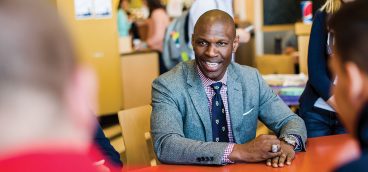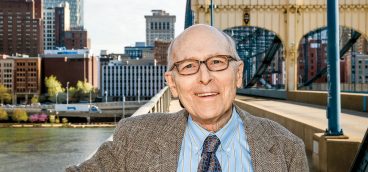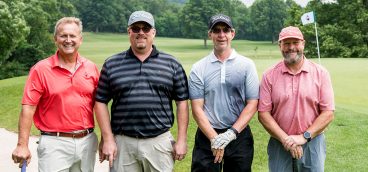Arnold Palmer, Golfing Legend and Entrepreneur

I was born in 1929 and raised during the Great Depression in Latrobe, Pa. Life was pretty tough in those days, but thankfully, my mother, father, little sister and I were together a whole lot of the time. We played golf, skied and went to movies—things like that—but we were basically homebodies.
I have many pleasant memories of those years.
I have a sister who is two years younger than me with whom I was raised. But 14 years after she was born, my parents had two more children—another boy and another girl—a second family, if you will—who were just kids when I got married and started having my own children. Naturally, I spent much of my time back then with my wife and my kids, and traveling. Brothers and sisters we were. But we weren’t together too much.
My parents had a lot to do with what and who I am today. All four of us kids knew that we were loved and cared for, and we learned discipline very early on. My father, Deacon Palmer, taught us manners, how to act among people and, I guess, just about everything else we needed to know to get along in the world. But he was never one to lay a lot of accolades on you. So it was really something special when he said, “You did good, kid.” He’d let you know if he thought you did something particularly well, then he’d drop it and move on. He always said what he thought, quickly and to the point. And that was it.
Starting at about 3 years old, I went to work with my dad, who was the golf course superintendent and greenskeeper at Latrobe Country Club. And I stayed at the golf course with him all day long. (My mother was tending to my sister, who was just newly born at the time.) Among other things, we got to cut the golf course grass together on a tractor! Memories of that place and of those times are some of the best of my childhood.
Back then, Latrobe was just another one of Pennsylvania’s small industrial towns. It was home to Latrobe Steel, American Locomotive, and so on, companies that were, for the most part, locally owned and controlled. It was those companies that built the town’s country club, which was just a nine-hole golf course with a clubhouse and swimming pool. Now my father, who was the golf pro there, was allowed to teach me to play, but we were not allowed to use the clubhouse. In those early days, that privilege was reserved strictly for club members. But then I really didn’t care. I had a great deal of fun anyway.
In truth, my life’s direction was set by my father’s working at that club at that time. He learned some important and useful lessons there from club members that he passed along to me, from simple things such as proper table manners (how to use a knife and fork) to the way to behave in groups of prominent people (best to be seen but not heard)—the sorts of things we don’t think about as much today as we did in the past.
I was in high school and then college in the 1940s, and attended Wake Forest University, on a golf scholarship, by the way. While there, unfortunately, my life was changed forever when my roommate and best friend, Bud Worsham, was killed in an automobile accident. It was all very disturbing because he was like a brother to me. I was really attached to Bud and, after he died, life was pretty lonely for a while. I decided that I needed to get away for a while, so I joined the U.S. Coast Guard and served for three years beginning in January of 1951. Joining the service helped me get my life going again. It was a very gratifying experience. The Coast Guard really helped me to mature.
As a young man, I was always playing a lot of golf and, from time to time, I had the opportunity to play with businesspeople who were members at the club. I got to know many of them very well, enough to understand how they did what they did. I had thoughts of becoming a golf pro at the time and felt very comfortable sharing those thoughts with those people. And I guess some of their “business sense” rubbed off on me.
Back then, a fellow by the name of Mark McCormack began representing me as his first and, at the time, only client. Before long, Mark brought in Jack Nicklaus and Gary Player, which led to the founding of IMG, the great sports agency. The rest is history. In any case, we were in the right place at the right time when television discovered golf. I did many commercials and a lot of work related to made-for-TV golf shows. Right away, we recognized the potential of linking the mass media with sports.
Now, jump forward a number of years. My partner at the time, Joe Gibbs, was in the cable television business and approached me with the idea of creating a 24-hour golf channel. I had many questions at first and spent a lot of time thinking about it. How would we fill 24 hours of TV time every day with golf? When I took even a shallow look at that, I knew it wasn’t going to be very easy. Of course, I thought, we could do lots of repeat stuff in the middle of the night. But, as it turned out, we were amazed at how many people stayed up to all hours just to take a golf lesson on TV! When we finally got to the point where we figured we could do it, we went out and raised the funds we needed and put the Golf Channel together. It took a while, but it worked. And I’m one of its founders.
In the years that followed, golf continued to grow in popularity. New golf courses were being designed and built all the time. Today, however, we’re all concerned that the game is off a bit. They’re closing more golf courses than they’re building right now, which is a big concern for those of us who are involved in the business. We’re doing everything we can to keep things going, and maybe we’re worrying too much. But we must be careful.
All in all, we think the game’s growth will pick up again very soon. I’m a designer of golf courses, and have designed about 300 new or remodeled courses around the world, which has kept me pretty busy through the years. And my partners and I are always looking for new ways to expand interest in the game.
What are some of golf’s problems? The time it takes to play a round. We’re looking at what we might be able to do about that. We’re also considering the cost of playing the game. How can we prevent it from getting too expensive for the up-and-coming players of the world, particularly in the United States? But we are excited that golf is going to be an Olympic sport in 2016, which we think will have a very favorable effect on the game worldwide. At present, we’re seeing people in places like China, Indonesia, Korea and Japan picking up the game and building more golf courses. In fact, we’re currently building three in the Far East. Now that’s the kind of growth we’ve been looking for—and we hope it continues.
In addition to golf, I was fortunate enough over the years to find other things that I like to do that, in one way or another, have enriched my life and helped my career. Take flying, for example. Since 1955, I’ve logged more than 20,000 hours of flying time and have traveled all over the world in my own airplane. When I started, flying wasn’t something that very many people did. But it became a very important tool in my life. Certainly, it has helped me do things that I wanted to do, personally and from a business perspective.
My home today is in Orlando, Fla. But a few years after my first wife, Winnie, passed away, I married again and built a brand new house for my new wife in Latrobe, where we still spend our summers. We also spend about a month in California each year, too. So life has been very good to me and I’m thankful for the opportunities that I’ve had.
The Arnold Palmer Design Company is located in Orlando, too. We have some young people working with us who are energetic and smart, and doing a wonderful job. Also in Orlando, I host an annual golf tournament called The Arnold Palmer Invitational. It’s an important stop on the PGA Tour. Most of the best professional players in the world come to play in that tournament every March at Bay Hill Club and Lodge.
Even now, at 81, I still do a little advertising work, and make speeches and appearances here and there, usually in connection with companies I represent, and mostly in the U.S. And I still travel internationally on business. Unfortunately, I’m not playing a lot of golf these days. Sure, I still hit some balls and practice. And I play occasionally with my friends. (They still get a kick out of that.) But naturally, my golf game keeps deteriorating because I’m getting older. The challenge is still there, however. And no matter what, the fact that I still can get up in the morning and look forward to going to work is a blessing at my age. I just try to hang in there and keep doing what I do.






